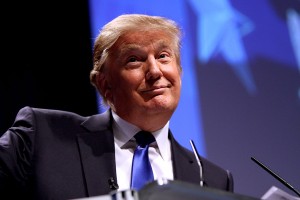Here’s the One Nice Thing We’ll Say about Donald Trump
 Photo by Gage Skidmore
Photo by Gage Skidmore He’s a real estate billionaire, the owner of the Miss USA pageant, and a denier of Barack Obama’s US citizenship. And now he wants to be President of the United States.
I’m referring, of course, to Donald Trump, who since declaring his candidacy for President has been a constant source of scorn and satire for putting his foot in his mouth many, many times. In June, he described Mexican immigrants as drug addicts, criminals, and rapists. (“Some, I assume, are good people,” he noted, as though this admission should excuse his bigotry.) Last month, he called a woman “disgusting” for needing to pump breast milk for her three-month-old daughter. Undoubtedly, as the campaign trail lumbers on, he’ll manage to top even these offensive statements. But even as he’s offending liberals with his obliviousness, he’s also offending the religious right in his failure to pander to them.
As a Republican candidate, Trump will need to drum up enough support from the party’s base to win the primary election. Previous candidates have often relied on appeals to conservative, right-wing Christians, who are often dependable in their willingness to show up to the polls on Election Day. Many of the GOP hopefuls are relying on this strategy by denying evolution as a scientific fact and rhapsodizing about their faith in God. Trump, however, while identifying as a Presbyterian, is not as quick to expound upon his belief in a higher power. Religion News Service quotes him in a 2012 interview as saying that he goes to church on Christmas, Easter, and major occasions, but not every week. More recently, he claimed to feel no need to ask for God’s forgiveness, even though repentance for sin is a cornerstone of Christianity. He also dismissed the Christian sacrament of Holy Communion as “drink[ing] the little wine…and eat[ing] the little cracker.” Instead of going out of his way to espouse his Christian faith, Trump seems unable to connect with evangelical voters, and it could cost his campaign in the long run.
While Trump is hardly a humanist, his reluctance to speak on religion is almost, though not quite, refreshing in a Republican candidate. In a truly secular government, a candidate’s religious perspectives would not play a role in his or her ability to promote policy and make decisions. Given that 23 percent of Americans are now identifying as nonreligious, the GOP will need more candidates who focus more on policy and less on faith if the party wants to remain relevant. However, conservatives don’t seem to be moving in that direction. Even Trump recently said that he “didn’t know about the atheist vote. They might not like me.”
At least atheists’ dislike for Trump probably comes from his racist and sexist views and not from his incessant pandering to conservative Christians. As the campaign for the Republican nomination continues, humanists will have to wait and see if Trump continues to avoid speaking about religion or if he caves to the pressure and begins bending over backward to accommodate the religious right.
